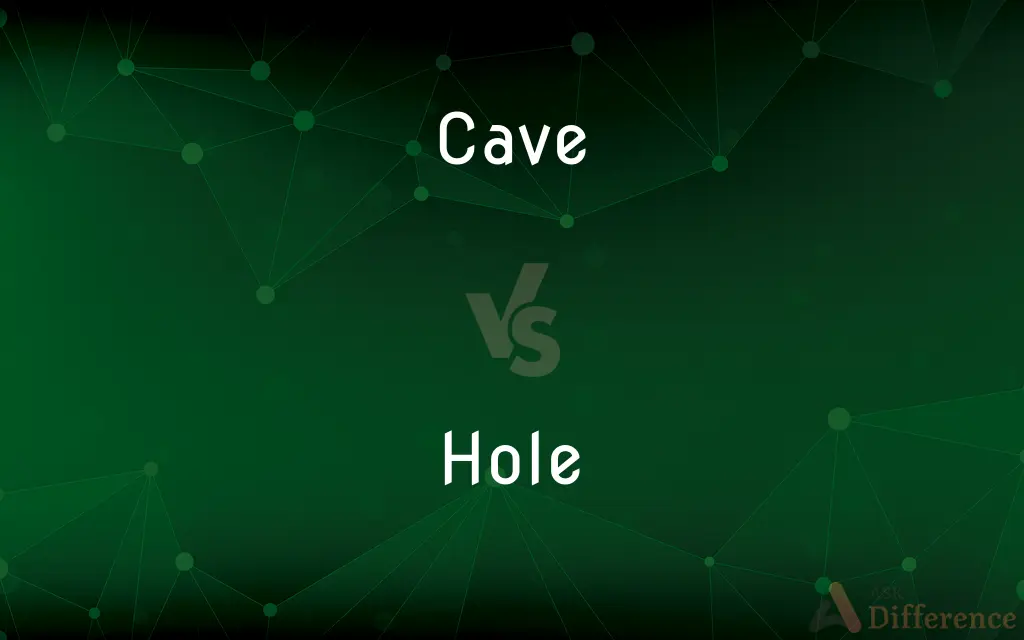Cave vs. Hole — What's the Difference?
By Urooj Arif & Maham Liaqat — Updated on March 27, 2024
A cave is a natural underground space large enough for a human to enter, often formed by geological processes, while a hole is a broad term for any opening or cavity in a surface, created naturally or artificially.

Difference Between Cave and Hole
Table of Contents
ADVERTISEMENT
Key Differences
Caves are naturally occurring spaces beneath the earth's surface, primarily formed through the process of erosion and weathering, offering unique ecosystems and geological formations. Holes, on the other hand, can be any opening, gap, or void on any surface or material, created by various means, including digging, drilling, or natural processes, without the specificity of location or formation process that defines caves.
While caves often serve as habitats for specific flora and fauna adapted to their dark, isolated environments, holes can range from tiny openings for a screw in a piece of wood to large excavations in the earth used for mining or construction purposes, not typically offering a stable ecosystem.
The formation of caves is usually a slow geological process involving water, chemical reactions, and erosion, leading to features like stalactites and stalagmites. Holes, however, can be formed quickly, such as when drilling into a wall, or over time, such as sinkholes forming due to water eroding underground rock.
In terms of exploration and human interest, caves attract speleologists and adventurers interested in their formation, history, and the ecosystems within. Holes, unless of significant depth or located in a context that gives them particular importance (like archaeological sites), generally attract less fascination.
Caves can be significant in various cultures as sacred or mystical places and have been used by humans for shelter, ritual, and burial sites throughout history. Holes, depending on their context, may hold utility or significance, such as wells for water or holes that are part of archaeological investigations, but lack the universal cultural significance of caves.
ADVERTISEMENT
Comparison Chart
Definition
A natural underground space large enough for humans to enter.
An opening or cavity in any surface or material.
Formation
Formed by geological processes such as erosion and chemical reactions.
Can be created naturally or artificially by any process that removes material.
Functionality
Serve as habitats, have geological and archaeological significance.
Utility varies widely, from construction to simple openings for objects.
Exploration Interest
High, due to unique ecosystems, geological formations, and cultural significance.
Varies, generally lower unless the hole has specific significance or utility.
Cultural Significance
Often significant, used as shelters, religious sites, or for burials historically.
Dependent on context, usually less universally significant than caves.
Compare with Definitions
Cave
Formed through geological processes.
The limestone cave was formed by centuries of water erosion.
Hole
An opening through a solid body or surface.
He drilled a hole in the wall to hang the painting.
Cave
A large, natural underground chamber.
The spelunkers explored the vast cave to study its ancient formations.
Hole
May occur naturally or be man-made.
The hole in the ice formed over a deep lake.
Cave
Habitats for unique ecosystems.
The cave is home to a species of blind fish found nowhere else.
Hole
Can be created for various purposes.
The gardener dug holes to plant new trees.
Cave
Often have cultural or mystical significance.
The cave has been a site of pilgrimage for centuries.
Hole
Varies in size and significance.
The hole in the ozone layer has garnered global concern.
Cave
Sites of archaeological interest.
Paintings in the cave provided clues to the lifestyle of early humans.
Hole
Utility dependent on context.
The archaeologists carefully excavated the hole, revealing ancient artifacts.
Cave
Capitulate or submit under pressure; cave in
He caved because his position had become untenable
She finally caved in the face of his persistence
Hole
A hollowed place in something solid; a cavity or pit
Dug a hole in the ground with a shovel.
Cave
A cave or cavern is a natural void in the ground, specifically a space large enough for a human to enter. Caves often form by the weathering of rock and often extend deep underground.
Hole
An opening or perforation
A hole in the clouds.
Had a hole in the elbow of my sweater.
Cave
A natural underground chamber in a hillside or cliff
The narrow gorge contains a series of prehistoric caves
Hole
(Sports) An opening in a defensive formation, such as the area of a baseball infield between two adjacent fielders.
Cave
Explore caves as a sport
They say they cave for the adventure, challenge, and physical exercise
Hole
A fault or flaw
There are holes in your argument.
Cave
(among children) look out!
Hole
A deep place in a body of water.
Cave
A hollow or natural passage under or into the earth, especially one with an opening to the surface.
Hole
An animal's hollowed-out habitation, such as a burrow.
Cave
A storage cellar, especially for wine.
Hole
An ugly, squalid, or depressing dwelling.
Cave
To dig or hollow out.
Hole
A deep or isolated place of confinement; a dungeon.
Cave
To cause to collapse or fall in. Often used with in
The impact caved in the roof of the car.
Hole
An awkward situation; a predicament.
Cave
To fall in; collapse. Often used with in
The walls caved in during the earthquake.
Hole
The small pit lined with a cup into which a golf ball must be hit.
Cave
To give up all opposition; yield. Often used with in
The school committee caved in to the demands of parents.
Hole
One of the divisions of a golf course, from tee to cup.
Cave
To explore caves.
Hole
(Physics) A vacant position in an atom left by the absence of a valence electron, especially a position in a semiconductor that acts as a carrier of positive electric charge. Also called electron hole.
Cave
A large, naturally-occurring cavity formed underground or in the face of a cliff or a hillside.
We found a cave on the mountainside where we could take shelter.
Hole
To put a hole in.
Cave
A hole, depression, or gap in earth or rock, whether natural or man-made.
Hole
To put or propel into a hole.
Cave
A storage cellar, especially for wine or cheese.
This wine has been aged in our cave for thirty years.
Hole
To make a hole in something.
Cave
A place of retreat, such as a man cave.
My room was a cozy cave where I could escape from my family.
Hole
A hollow place or cavity; an excavation; a pit; a dent; a depression; a fissure.
I made a blind hole in the wall for a peg.
I dug a hole and planted a tree in it.
Cave
(caving) A naturally-occurring cavity in bedrock which is large enough to be entered by an adult.
It was not strictly a cave, but a narrow fissure in the rock.
Hole
An opening that goes all the way through a solid body, a fabric, etc.; a perforation; a rent.
There’s a hole in my shoe.
Her stocking has a hole in it.
Cave
(nuclear physics) A shielded area where nuclear experiments can be carried out.
Hole
(heading) In games.
Cave
Debris, particularly broken rock, which falls into a drill hole and interferes with drilling.
Hole
(golf) A subsurface standard-size hole, also called cup, hitting the ball into which is the object of play. Each hole, of which there are usually eighteen as the standard on a full course, is located on a prepared surface, called the green, of a particular type grass.
Cave
(mining) A collapse or cave-in.
Hole
(golf) The part of a game in which a player attempts to hit the ball into one of the holes.
I played 18 holes yesterday.
The second hole today cost me three strokes over par.
Cave
The vagina.
Hole
(baseball) The rear portion of the defensive team between the shortstop and the third baseman.
The shortstop ranged deep into the hole to make the stop.
Cave
A group that breaks from a larger political party or faction on a particular issue.
Hole
(chess) A square on the board, with some positional significance, that a player does not, and cannot in future, control with a friendly pawn.
Cave
(obsolete) Any hollow place, or part; a cavity.
Hole
(stud poker) A card (also called a hole card) dealt face down thus unknown to all but its holder; the status in which such a card is.
Cave
(programming) A code cave.
Hole
In the game of fives, part of the floor of the court between the step and the pepperbox.
Cave
To surrender.
He caved under pressure.
Hole
An excavation pit or trench.
Cave
To collapse.
First the braces buckled, then the roof began to cave, then we ran.
Hole
(figuratively) A weakness; a flaw or ambiguity.
I have found a hole in your argument.
Cave
To hollow out or undermine.
The levee has been severely caved by the river current.
Hole
(informal) A container or receptacle.
Car hole;
Brain hole
Cave
To engage in the recreational exploration of caves.
I have caved from Yugoslavia to Kentucky.
Let's go caving this weekend.
Hole
(physics) In semiconductors, a lack of an electron in an occupied band behaving like a positively charged particle.
Cave
(mining) In room-and-pillar mining, to extract a deposit of rock by breaking down a pillar which had been holding it in place.
The deposit is caved by knocking out the posts.
Hole
(computing) A security vulnerability in software which can be taken advantage of by an exploit.
Cave
To work over tailings to dress small pieces of marketable ore.
Hole
An orifice, in particular the anus. When used with shut it always refers to the mouth.
Just shut your hole!
Cave
(obsolete) To dwell in a cave.
Hole
Solitary confinement, a high-security prison cell often used as punishment.
Cave
Look out!; beware!
Hole
(slang) An undesirable place to live or visit.
His apartment is a hole!
Cave
A hollow place in the earth, either natural or artificial; a subterraneous cavity; a cavern; a den.
Hole
(figurative) Difficulty, in particular, debt.
If you find yourself in a hole, stop digging.
Cave
Any hollow place, or part; a cavity.
Hole
(graph theory) A chordless cycle in a graph.
Cave
A coalition or group of seceders from a political party, as from the Liberal party in England in 1866. See Adullam, Cave of, in the Dictionary of Noted Names in Fiction.
Hole
A passing loop; a siding provided for trains traveling in opposite directions on a single-track line to pass each other.
We’re supposed to take the hole at Cronk and wait for the Limited to pass.
Cave
To make hollow; to scoop out.
The mouldred earth cav'd the banke.
Hole
(transitive) To make holes in (an object or surface).
Shrapnel holed the ship's hull.
Cave
To dwell in a cave.
Hole
To destroy.
She completely holed the argument.
Cave
To fall in or down; as, the sand bank caved. Hence (Slang), to retreat from a position; to give way; to yield in a disputed matter.
Hole
(intransitive) To go into a hole.
Cave
An underground enclosure with access from the surface of the ground or from the sea
Hole
(transitive) To drive into a hole, as an animal, or a billiard ball or golf ball.
Woods holed a standard three foot putt
Cave
Hollow out as if making a cave or opening;
The river was caving the banks
Hole
(transitive) To cut, dig, or bore a hole or holes in.
To hole a post for the insertion of rails or bars
Cave
Explore natural caves
Hole
Whole.
Hole
A hollow place or cavity; an excavation; a pit; an opening in or through a solid body, a fabric, etc.; a perforation; a rent; a fissure.
The holes where eyes should be.
The blind wallsWere full of chinks and holes.
The priest took a chest, and bored a hole in the lid.
Hole
An excavation in the ground, made by an animal to live in, or a natural cavity inhabited by an animal; hence, a low, narrow, or dark lodging or place; a mean habitation.
The foxes have holes, . . . but the Son of man hath not where to lay his head.
Hole
A small cavity used in some games, usually one into which a marble or ball is to be played or driven; hence, a score made by playing a marble or ball into such a hole, as in golf.
Hole
To cut, dig, or bore a hole or holes in; as, to hole a post for the insertion of rails or bars.
Hole
To drive into a hole, as an animal, or a billiard ball.
Hole
To go or get into a hole.
Hole
An opening into or through something
Hole
An opening deliberately made in or through something
Hole
One playing period (from tee to green) on a golf course;
He played 18 holes
Hole
An unoccupied space
Hole
A depression hollowed out of solid matter
Hole
A fault;
He shot holes in my argument
Hole
Informal terms for a difficult situation;
He got into a terrible fix
He made a muddle of his marriage
Hole
Informal terms for the mouth
Hole
Hit the ball into the hole
Hole
Make holes in
Common Curiosities
What is a hole?
A hole is any opening, gap, or void that goes through any surface or material, which can be created by natural processes, drilling, digging, or other means.
How do caves differ from holes in terms of formation?
Caves are formed through specific geological processes like erosion, while holes can be formed through a variety of methods, both naturally and artificially.
Why are caves important for archaeological studies?
Caves have often been used by humans and their ancestors for shelter and rituals, containing artifacts, paintings, and remains that offer insights into prehistoric life.
What types of animals live in caves?
Many caves are home to specialized species known as troglobites, including bats, fish, and insects, which have adapted to the dark, constant climate of cave environments.
Can a hole become a habitat like a cave?
While some holes, especially large ones, can provide habitat for certain species, caves are particularly known for their unique ecosystems and conditions suitable for specific flora and fauna.
Do all holes serve a practical purpose?
While many holes are created with a specific utility in mind, such as for construction or planting, others may form naturally without an apparent purpose until they are utilized by humans or other species.
Can anyone visit a cave?
While many caves are open to the public for tours and exploration, some require special permission or expertise to visit due to their delicate ecosystems or hazardous conditions.
What is a cave?
A cave is a natural underground space, large enough for a human to enter, formed by geological processes and found throughout the world.
What makes a cave culturally significant?
Caves have been places of shelter, mystery, and religious importance across various cultures, hosting ancient artworks, burial sites, and serving as venues for rituals.
How do caves impact the environment?
Caves can act as critical water reservoirs, support unique ecosystems, and contribute to the biodiversity of the surrounding area through their role in local groundwater systems.
How are new caves discovered?
New caves are often discovered by spelunkers or scientists through dedicated exploration efforts, studying geological formations, or following water courses underground.
How are caves and holes explored differently?
Caves often require specialized skills and equipment for exploration due to their size, complexity, and environmental conditions, whereas holes' exploration depends on their purpose and context.
How are holes repaired or filled?
The method for repairing or filling a hole depends on its size, location, and purpose, ranging from simple patching materials for small holes to complex engineering projects for large excavations.
Can holes affect the structural integrity of buildings?
Yes, holes in structural elements can compromise the integrity of a building if not properly addressed, leading to potential safety hazards.
What is the largest man-made hole?
The largest man-made hole is often considered to be the Bingham Canyon Mine in Utah, USA, a massive open-pit copper mine.
Are there famous holes with historical significance?
Yes, some holes are of historical significance, such as archaeological sites where ancient artifacts have been uncovered, telling stories of past civilizations.
What are the dangers of exploring caves?
Cave exploration can present risks such as getting lost, falling, flooding, hypothermia, and impacting sensitive cave environments.
How do holes contribute to scientific research?
Holes drilled into the Earth's crust, like those for ice core samples or deep-sea vents, provide valuable data on climate history, geology, and marine biology.
Share Your Discovery

Previous Comparison
Prediction vs. Guess
Next Comparison
Almain vs. AllemandeAuthor Spotlight
Written by
Urooj ArifUrooj is a skilled content writer at Ask Difference, known for her exceptional ability to simplify complex topics into engaging and informative content. With a passion for research and a flair for clear, concise writing, she consistently delivers articles that resonate with our diverse audience.
Co-written by
Maham Liaqat















































